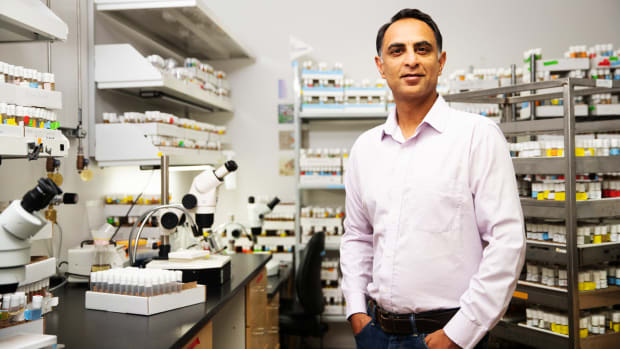Life Sciences
Google and Zuckerberg-Affiliated Researchers Want to Track Your Age Using This Body Part
Researchers working with Google Health and Zuckerberg San Francisco General Hospital are on a mission.

Researchers working with Google Health and Zuckerberg San Francisco General Hospital are on a mission.
Poets, artists and Disney (DIS) – Get Free Report animators have historically emphasized the importance of eyes, but now a particular group of scientists has found a truly unusual health-related use for them.
Researchers working with Google (GOOG) – Get Free Report Health and Zuckerberg San Francisco General Hospital are collaborating on a project that could help map your biological age by using deep learning to examine your eyes.
DON’T MISS: Mark Zuckerberg Quietly Buries the Metaverse
Biological age is different from chronological age. The former is a measure of how old your cells and systems are, based on a variety of factors like stress and inflammation. Chronological age measures how many birthdays you’ve had.
Prof. Pankaj Kapahi of Buck Institute for Research on Aging and colleagues at his lab are mapping blood vessels in the eye to track certain markers that may indicate a patient’s underlying health.

Buck Institute/Istock
The blood vessels in the eye are some of the smallest in the body and therefore tend to show inflammation — the body fighting something — first.
The Eyes Are a Good Indicator of Health
Scientists and doctors look at the eyes to help identify and diagnose other diseases, like tumors and high blood pressure. This new technology would take this effort further, enabling clinicians to track and measure how well things are going — and how quickly you’re aging — rather than finding a problem once it’s too late.
Kapahi’s team in Novato, Calif., together with Google Health (GOOGL) – Get Free Report and Zuckerberg General created an extensive genome-wide association study, which essentially sets the foundation for a genetic biological clock, known as eyeAge.
“This type of imaging could be really valuable in tracking the efficacy of interventions aimed at slowing the aging process,” Kapahi said.
“The results suggest that potentially, in less than one year we should be able to determine the trajectory of aging with 71% accuracy by noting discernable changes in the eyes of those being treated, providing an actionable evaluation of gero-protective therapeutics.”
Could This Revolutionize Health Care?
Alphabet’s Google and its deep learning have been specifically helpful in the study; its advanced and highly calibrated machines can sense even the slightest change or anomaly in the eye that may not be otherwise visible to humans.
Google and other researchers have been able to use the tech to identify nearly 40 diseases, both in the eye and elsewhere in the body (like kidney disease, for example).
“In all, Google researchers trained and tuned the model for eyeAge using the well-studied EyePACS data set that involved over 100,000 patients, and then applied it to more than 64,000 patients from the UK Biobank,” StudyFinds says.

Wittiest stocks:: Avalo Therapeutics Inc (NASDAQ:AVTX 0.00%), Nokia Corp ADR (NYSE:NOK 0.90%)
There are two main reasons why moving averages are useful in forex trading: moving averages help traders define trend recognize changes in trend. Now well…
Spellbinding stocks: LumiraDx Limited (NASDAQ:LMDX 4.62%), Transocean Ltd (NYSE:RIG -2.67%)
There are two main reasons why moving averages are useful in forex trading: moving averages help traders define trend recognize changes in trend. Now well…
Asian Fund for Cancer Research announces Degron Therapeutics as the 2023 BRACE Award Venture Competition Winner
The Asian Fund for Cancer Research (AFCR) is pleased to announce that Degron Therapeutics was selected as the winner of the 2023 BRACE Award Venture Competition….














